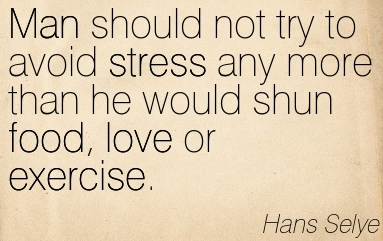 I used to be stressed out all the time. Now, I do feel stressed out once in a while but I’m much better at managing my stress levels than I used to be. I’ve read countless books on stress management and I’m going to summarize everything I learned in this blog post.
I used to be stressed out all the time. Now, I do feel stressed out once in a while but I’m much better at managing my stress levels than I used to be. I’ve read countless books on stress management and I’m going to summarize everything I learned in this blog post.
Is It Helpful?
I believe that categorizing feelings as “good” or “bad” is a terrible idea. Take stress for example. If you have an important project coming up, a low level of stress can remind you about the importance of the project and motivate you to get prepared for it. However, too much stress can make you tired, grumpy and actually decrease your chances of completing the project successfully.
So, we can’t say that stress is good or bad. But we can say that it can be helpful up to a point, after which it starts hurting you. This is a very important distinction because if you see stress as something bad you’ll just want it to go away. There are two problems with this approach:
- You’d be ignoring the benefits of stress. Stress is just your body letting you know that there’s something off you need to fix. Ignoring this signal isn’t a good idea.
- What you resist persists. The more you try to push a feeling away, the more it’s going to grasp to stay on your mind.
The Solution? Mindfulness
Stress isn’t your enemy. If you consider stress your enemy and want to kick it out of your mind, it won’t leave. Instead, try telling your stress the following next time it shows up: “Hey, thank you for the reminder, I appreciate it.” Then do whatever is in your power and accept that there are things outside of your control. For example, if you’re doing a sales presentation, you can do a ton of research and rehearse your presentation so it’s great, but you don’t have control over the outcome. The prospect can decide to buy or not.
So, if what you resist persists, how can you help stress go away without pushing it away? Mindfulness is the solution. Shedding light on the way you’re feeling makes all the difference. For example, you could say “I have a sales presentation tomorrow and this is stressing me out. I’m breathing really fast, there’s tightness in my belly area and my heart is beating really fast. I’ll just observe these things as they happen.”
Now, this is the important part: observe but don’t judge. We’ve been conditioned to want to change anything about ourselves that we don’t like. But again: stress is not your enemy. It’s just here to deliver a message. Just listen to it and say “thank you.”
I learned that there are two main things that stress me out:
- When I’m trying to do more things than I can realistically do
- When I’m working on something without a purpose
Once I learned this about myself I got a lot better at giving myself more time to work on my projects and saying “no” to projects that don’t fulfill me. But these are the things that stress me out. You’ll have to find for yourself what stresses you out. And, you do this by
- understanding that stress is your friend and listening to it,
- understanding where it stops being helpful and starts being hurtful and
- observing how it affects you instead of trying to push it away.
Have a great day!

